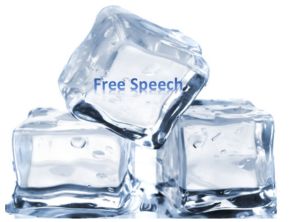Is the U of MN “Bias Response Team” Chilling Free Speech?
 Dear University of Minnesota students, don’t ditch the winter clothes yet. The chilling effect could be coming to your campus, if it’s not there already.
Dear University of Minnesota students, don’t ditch the winter clothes yet. The chilling effect could be coming to your campus, if it’s not there already.
Okay, the term chilling effect isn’t temperature related. But it should raise concern. In a legal context, a chilling effect discourages the legitimate exercise of a natural and legal right, like free speech, because of the possible negative results that could come from exercising that right.
According to a Star Tribune article, there’s worry the U of MN’s “bias response team” could result in a chilling effect on campus.
The U’s team, renamed the Bias Response and Referral Network (BRRN), decides if free speech is an act of bigotry or really just the First Amendment in action.
The problem… is that free speech is often the first victim when bias response teams appear on campus.
“At some point, it is policing what people are saying,” said Amna Khalid, an assistant professor of history at Carleton College in Northfield. Instead of encouraging students to confront opposing views, she says, it turns them into informants. “No matter how well-intentioned these committees may be, what they end up doing is really infantilizing our students,” she said.
Professor Khalid hits on a key point: Policing speech on campus encourages students to avoid, or worse, silence, those who speak statements and arguments they dislike and disagree with.
The bias incidents recently reported to BRRN do not threaten the physical well-being of the “victim.” We all will be or have been offended. Giving college students an outlet to play the victim card whenever they are offended does not empower them. Nor does it create a space for them to discuss controversial topics across all academic disciplines.
To Khalid, the Carleton professor, the problem is that bias teams can affect education. “Nothing quite kills intellectual exploration like the fear of causing offense,” she and Jeffrey Snyder wrote in a 2016 essay in the New Republic.
That’s especially toxic in a classroom, says Snyder, also an assistant professor at Carleton. “Something like race becomes so charged that we’re afraid to say anything about it,” he said.
U officials say they’ve seen no evidence of this or “evidence of a chilling effect.”
Or they just don’t notice it.
The university should brace itself for the slippery slope ahead. The influx of bias response teams on college campuses has led to suppression of free speech and academic freedom. That gives me the chills.